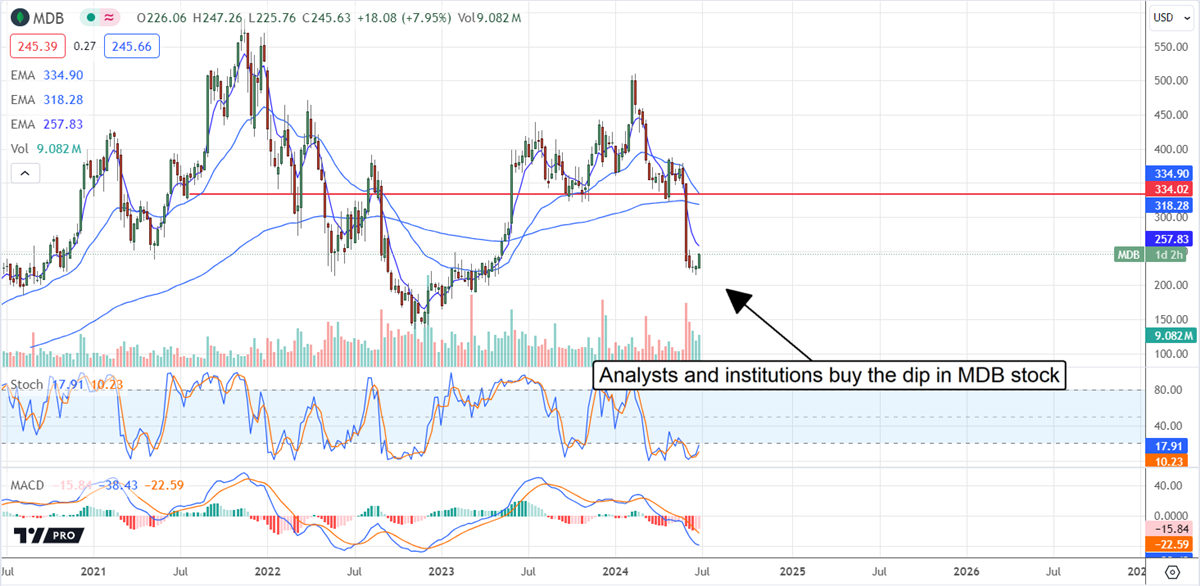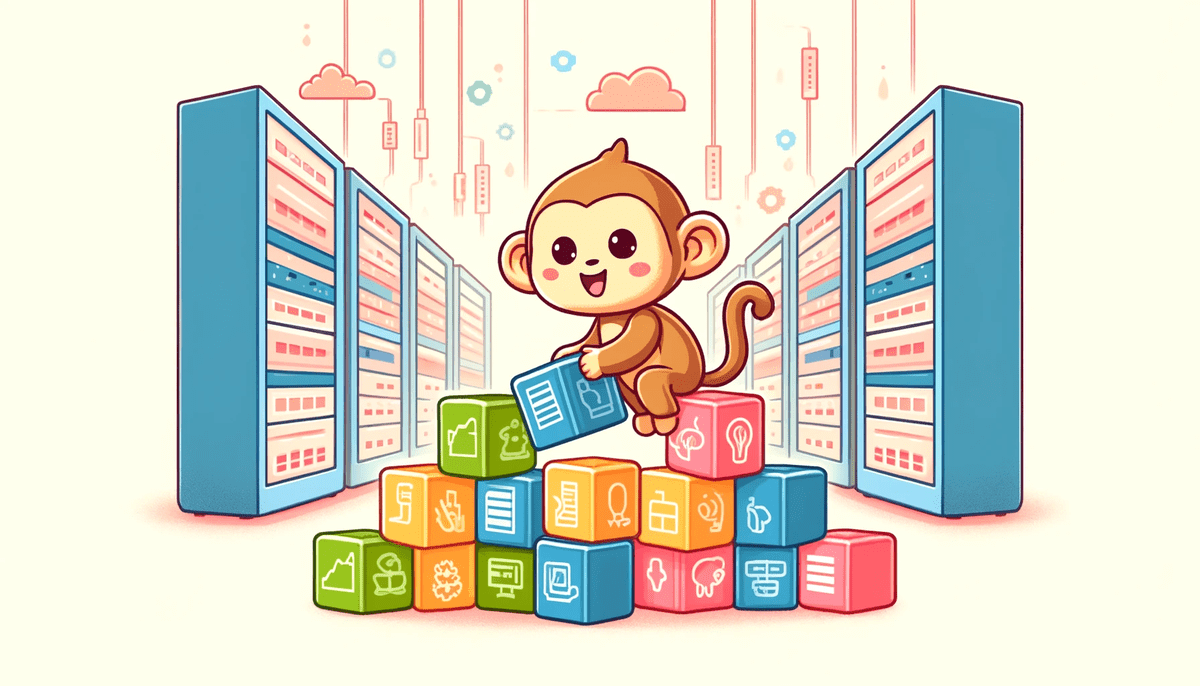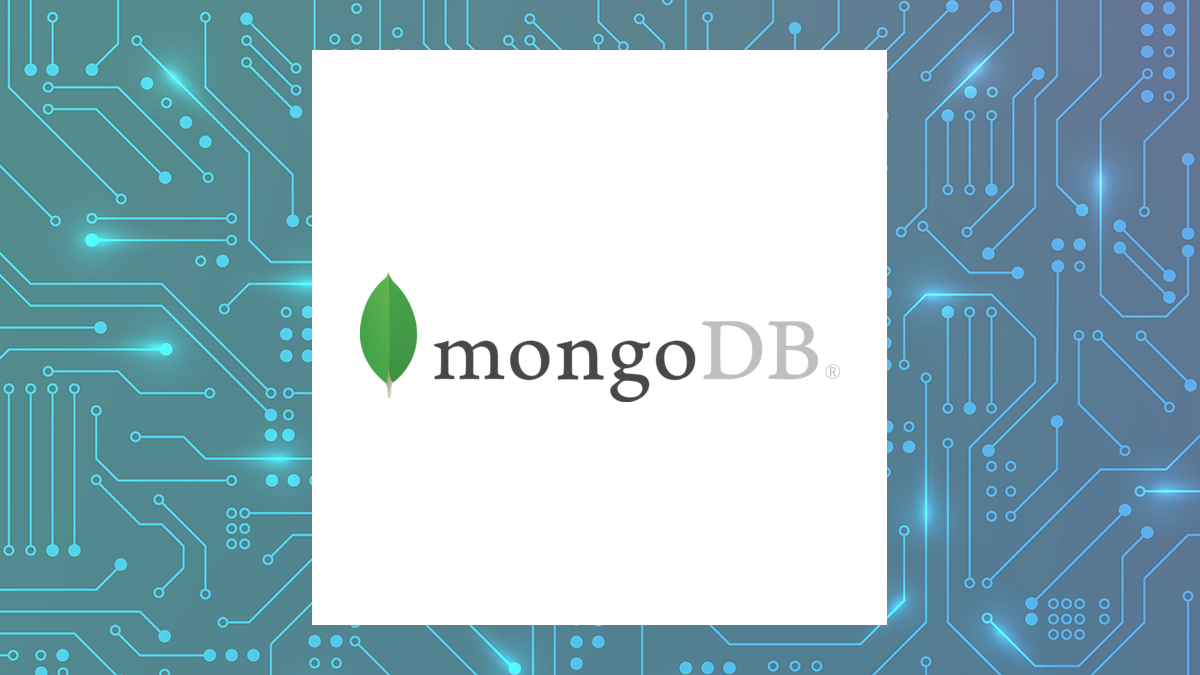Month: June 2024

MMS • RSS

Shares of MongoDB (NASDAQ: MDB) fell hard in Q2 for one reason and one reason alone- the guidance. Unlike other AI winners, the company’s guidance is for growth but tepid, anemic growth compared to the whisper expectations. The guidance resulted in a 50% decline for the stock from peak to bottom, assuming a bottom is in play, and 40% for the year, providing a deep discount for investors. The question is if it’s time to buy the dip, and the answer may be yes.
The problem for MongoDB stock prices today is the timeline for AI development. The timeline includes a push to generate new AI-powered software and apps, which will come later. Today, the focus is on NVIDIA (NASDAQ: NVDA) and Advanced Micro Devices (NASDAQ: AMD) GPUs and accelerators needed for the infrastructure. The software and apps will come once the infrastructure is built and the models trained. Or so goes the theory.
Analysts’ Conviction is High for MDB Stock
The analysts remain steady in their support for MongoDB despite the weaker-than-expected outlook. The news resulted in some price target reductions, but the takeaway is that this stock is a Moderate Buy with a 45% upside. The consensus is down from a peak set in the first half but still up compared to last year, and the stock is trading below the lowest target, suggesting real value is present.
Analysts’ chatter following the Q1 release was favorable despite the declining targets. The takeaway is that weakened IT spending in the first half impacted the results, but the long-term outlook is much brighter. Like the proliferation of software companies that blossomed along with the Internet, AI is expected to drive a similar wave of software needs that MongoDB is positioned to facilitate. Its Atlas cloud database system, which uses and provides AI assistance, is easy to use; the free tier leads to paid clients and scales with business.
The latest update comes from Citigroup, which says it buys the dip. The firm is optimistic, putting MongoDB at the top of its list of enterprise software firms. While seasonal headwinds are hurting the outlook now, an inflection is coming for the stock that will include increased enterprise IT spending, lower interest rates, and seasonal estimate revisions. No price target was given.
Institutions are Buying the Dip in MongoDB: Short Covering May Start Soon
Analysts are not the only ones buying the dip in MongoDB. Institutional activity has slacked off from its peak in Q1 but remains bullish on balance in Q2. Institutional activity has been bullish on balance for three consecutive quarters and five of the last six quarters, bringing total ownership to nearly 90%. The May and June activity is exciting because it includes numerous triple-digit position increases, including a 400% increase for Plato Investment Management, a 300% increase for Cetera Investment Advisors, and a 200% increase for Western Pacific Wealth Management.
Short interest is also in play with this stock. The 6% short interest reported in mid-June isn’t enough to fuel a squeeze, but short-covering could aid upward momentum. As it is, the market is showing signs of a bottom that could lead to a rebound later this year. The bottom is near $245 and aligns with previous support seen in 2022 and a congestion band in 2023 that reveals intense market activity. Assuming the market sustains support at this level, a rebound could form soon.
Among the long-term drivers for the stock price is the business quality. The company is still generating GAAP losses but is profitable on an adjusted basis. It generates free cash flow, and free cash flow is growing. Highlights from the Q1 report include increased cash, no long-term debt, reduced liabilities, and a 20% increase in shareholder equity.

Source MarketBeat

MMS • RSS

Image generated with ChatGPT
The ability to efficiently store, manage, and analyze vast amounts of information is crucial for any organization. As data continues to grow in volume and complexity, traditional databases often fall short of meeting modern demands. This is where next-generation databases come into play—designed to be fast, secure, and cost-effective, they offer innovative solutions for handling large-scale and diverse data issues.
In this blog, we will learn about seven modern SQL databases making waves in 2024. These databases provide robust performance and scalability and are equipped with advanced features like AI integration.
1. Dolt
Dolt is an open-source, version-controlled database that combines the power of Git with the functionality of a relational database. With Dolt, you can fork, clone, branch, merge, push, and pull databases just like you would with a Git repository.
Dolt is MySQL-compatible, allowing you to run SQL queries and use the command line interface to manage your data. This version-controlled database is ideal for collaborative environments where tracking changes and maintaining data integrity are paramount.
Just like GitHub, DoltHub is a place where people can share their database. You can access the public database for free just like GitHub.
2. MongoDB
MongoDB is a popular NoSQL database known for its flexibility and scalability. it uses a document-oriented data model, which allows for the storage of semi-structured data. With its flexible data model and rich ecosystem of tools and services, MongoDB is a favorite among developers and enterprises alike. Its ability to handle large amounts of unstructured data makes it an ideal choice for modern applications.
MongoDB is available in different environments, including MongoDB Atlas (a fully managed service in the cloud), MongoDB Enterprise (a subscription-based, self-managed version), and MongoDB Community (a free-to-use, self-managed version).
3. Redis
Redis is a fast in-memory database used as a caching, vector search, message broker, and NoSQL databases that seamlessly fit into any tech stack. Known for its high performance and low latency, Redis is widely used in real-time applications such as caching, session management, and real-time analytics. Its support for various data structures like strings, hashes, lists, sets, and more makes it a powerful tool for developers.
4. MindsDB
MindsDB is a platform that enhances SQL databases with machine learning capabilities. It allows you to build, fine-tune, and serve machine learning models directly within your database using familiar SQL syntax. MindsDB integrates with numerous data sources, including databases, vector stores, and applications, and popular AI/ML frameworks for AutoML and LLMs.
Imagine Transformers, LangChain, Vector database, OpenAI API, SQL and NoSQL database, and agents all in one, and you can access them using SQL syntax. It is a dream for data engineers and analysts.
5. Clickhouse
ClickHouse is an open-source columnar database management system designed for online analytical processing (OLAP). It is known for its high performance and efficiency in handling large volumes of data. ClickHouse is particularly well-suited for real-time analytics and big data applications, providing fast query performance and scalability.
Apart from being blazing fast, ClickHouse is developer-friendly as complex data analysis can be done using simple SQL. Moreover, it is cost-effective with compression ratios that reduce storage and accelerate performance.
6. Elasticsearch
Elasticsearch is a distributed, RESTful search and analytics engine built on Apache Lucene. It securely stores your data for lightning-fast search, fine?tuned relevancy, and powerful analytics that scale quickly. Elasticsearch is often used with the ELK stack (Elasticsearch, Logstash, Kibana) for log and event data analysis, making it a popular choice for monitoring and observability solutions. With Elasticsearch, you can easily tackle large-scale data challenges, ensuring that your search and analytics capabilities grow alongside your data.
7. Snowflake
Snowflake is a cloud-based data warehousing solution that offers a unique architecture to handle diverse data workloads. It separates storage and compute, allowing for independent scaling of resources. Snowflake supports structured and semi-structured data, providing robust data sharing and collaboration features. Its seamless integration with various cloud platforms makes it a go-to choice for modern data warehousing needs.
Final Thoughts
Picking the best database system is very important for how well your organization can handle, analyze, and get useful information from data. By understanding the strengths and features of these modern SQL databases, you can make informed decisions that align with your specific requirements. Using these technologies not only enhances your data engineering operations but also positions your organization for future growth and success.
Abid Ali Awan (@1abidaliawan) is a certified data scientist professional who loves building machine learning models. Currently, he is focusing on content creation and writing technical blogs on machine learning and data science technologies. Abid holds a Master’s degree in technology management and a bachelor’s degree in telecommunication engineering. His vision is to build an AI product using a graph neural network for students struggling with mental illness.

MMS • RSS
MongoDB (MDB) closed the most recent trading day at $214.21, moving +1.81% from the previous trading session. This change outpaced the S&P 500’s 1.46% gain on the day. At the same time, the Dow added 1.09%, and the tech-heavy Nasdaq gained 6.63%.
Prior to today’s trading, shares of the database platform had gained 6.89% over the past month. This has lagged the Computer and Technology sector’s gain of 9.6% and outpaced the S&P 500’s gain of 4.75% in that time.
Investors will be hoping for strength from MongoDB as it approaches its next earnings release. The company is expected to report EPS of $0.07, up 177.78% from the prior-year quarter. Meanwhile, our latest consensus estimate is calling for revenue of $335.84 million, up 26.02% from the prior-year quarter.
For the full year, our Zacks Consensus Estimates are projecting earnings of $0.31 per share and revenue of $1.26 billion, which would represent changes of +152.54% and +44.04%, respectively, from the prior year.
Any recent changes to analyst estimates for MongoDB should also be noted by investors. Recent revisions tend to reflect the latest near-term business trends. With this in mind, we can consider positive estimate revisions a sign of optimism about the company’s business outlook.
Based on our research, we believe these estimate revisions are directly related to near-team stock moves. We developed the Zacks Rank to capitalize on this phenomenon. Our system takes these estimate changes into account and delivers a clear, actionable rating model.
The Zacks Rank system ranges from #1 (Strong Buy) to #5 (Strong Sell). It has a remarkable, outside-audited track record of success, with #1 stocks delivering an average annual return of +25% since 1988. Within the past 30 days, our consensus EPS projection remained stagnant. MongoDB is holding a Zacks Rank of #2 (Buy) right now.
Investors should also note MongoDB’s current valuation metrics, including its Forward P/E ratio of 689.87. This represents a premium compared to its industry’s average Forward P/E of 40.75.
The Internet – Software industry is part of the Computer and Technology sector. This group has a Zacks Industry Rank of 74, putting it in the top 30% of all 250+ industries.
The Zacks Industry Rank includes is listed in order from best to worst in terms of the average Zacks Rank of the individual companies within each of these sectors. Our research shows that the top 50% rated industries outperform the bottom half by a factor of 2 to 1.
Be sure to follow all of these stock-moving metrics, and many more, on Zacks.com.
Want the latest recommendations from Zacks Investment Research? Today, you can download 7 Best Stocks for the Next 30 Days. Click to get this free report
MongoDB, Inc. (MDB) : Free Stock Analysis Report

MMS • Diogo Carleto

Redis has released its new product named Redis Cloud Packages, a combination of pre-configured Redis Cloud instances designed to meet specific workloads and use cases, allowing users to skip from manual configurations and removing the hassle of managing Redis instances, making it more accessible and efficient for developers. Users can use a package for caching, NoSQL databases, or vector search.
Redis Cloud is designed to deliver a fully-managed Redis database on major public cloud services, providing all the features of Redis Enterprise to users, such as: instant failover, backups and recovery, 24/7 monitoring and support, linear scalability and predictable performance.
Redis as a Vector search aims to provide a foundation for AI applications from recommendation systems to document chat, allowing developers to ground their own virtual assistants utilizing agents and RAG (Retrieval Augmented Generation) to enhance responses from LLMs (Large Language Models). Furthermore, Redis Vector indexes are managed with similarity search. Users can choose between the following techniques: FLAT – that is a brute force approach, and HSNW – an approximate method utilizing Hierarchical Small Word graphs efficient search. The metrics supported in Redis vector search to measure the similarity between two vectors are Euclidean, Inner Product, and Cosine. Users interested in exploring Redis Vector search can find resources in the Redis learn section page.
Harrison Chase, co-founder and CEO of LangChain, stated:
“We’re using Redis Cloud for everything persistent in OpenGPTs, including as a vector store for retrieval and a database to store messages and agent configurations. The fact that you can do all of those in one database from Redis is really appealing.”
RedisJSON is a high-performance NoSQL document store that provides native APIs to ingest, index, run query and full-text search on JSON documents, its main capabilities including:
- In-Memory JSON store – Store and process scheme-free JSON in-memory, supporting millions of operations per second
- Index and querying – it is possible to create indexes on JSON documents, perform complex aggregations, and filter by properties, numeric ranges, and geographical distance
- Full-text / fuzzy search – JSON supports full-text indexing and stemming-based query expansion in multiple languages, providing a rich query language that can perform text searches, as well as complex structured queries, and “fuzzy” searches
Let’s see an example of the creation of a JSON document within a single Redis key named “testkey”:
redis> JSON.SET testkey . '[ 123, { "life": 42 },{"fish","please"} ]'
OK
redis> JSON.GET testkey "[123,{"life":42},{"fish","please"}]"
It is important to notice that both Redis Enterprice and Redis Cloud are compatible with Redis Community Edition.
To get started, users just need to sign up with a Google or GitHub account and choose between the plans available. Currently there are three subscription plans:
- Free Redis Cloud Essentials – designed for training and prototyping purposes, it comes with 30MB storage and max 30 concurrent connections
- Redis Cloud Essentials (paid) – a cost-efficient option for low throughput scenarios; it comes with a storage capacity ranging from 250MB to 12GB, and 256 to Unlimited concurrent connections
- Redis Cloud Pro – this one supports more databases, greater throughput and unlimited connections compared to the Redis Cloud Essentials, it brings 50TB storage and unlimited concurrent connections
More details about subscriptions plans are available on the subscription page.

MMS • RSS

Cloud services provider Leaseweb has announced the availability of its public cloud service. It offers a blend of “cost-effective flexibility” and global availability, said the Holland-headquartered firm.
It is designed to be “around 30% cheaper” than traditional hyperscalers, said the provider, while maintaining performance and reliability.
Leaseweb Public Cloud operates a “transparent” pricing model that “eliminates hidden costs”. This allows businesses to avoid upfront investment in software licenses or data centre infrastructure, while benefiting from an on-demand subscription model that supports hourly and monthly billing without long-term commitments.
“It is compatible with existing hyperscale platforms, making it suitable for organisations deploying new workloads and migrating existing ones,” said the firm.
The solution is available globally across seven regions to minimise latency. It is suitable for a wide range of industries and use cases, from fintech and SaaS to martech and gaming.
“Leaseweb Public Cloud has been designed in close consultation with customers who value the hyperscale concept but want an alternative with better price, performance and flexibility,” said Con Zwinkels, CEO at Leaseweb. “Our track record, leadership and customer-first approach position us to make a significant, positive impact on the public cloud market.”
Levi & Korsinsky Investigates Possible Securities Fraud Violations by MongoDB, Inc. (MDB)

MMS • RSS
NEW YORK, NY / ACCESSWIRE / June 28, 2024 / Levi & Korsinsky notifies investors that it has commenced an investigation of MongoDB, Inc. (“Mongo”) (NASDAQ:MDB) concerning possible violations of federal securities laws.
On March 7, 2024, Mongo reported strong Q4 2024 results and then announced lower than expected full-year guidance for 2025. Mongo attributed it to the Company’s change in its “sales incentive structure” which led to a decrease in revenue related to “unused commitments and multi-year licensing deals.”
Following this news, Mongo’s stock price fell by $28.59 per share to close at $383.42 per share.
Later, on May 30, 2024, Mongo further lowered its guidance for the full year 2025 attributing it to “macro impacting consumption growth.” Analysts commenting on the reduced guidance questioned if changes made to the Company’s marketing strategy “led to change in customer behavior and usage patterns.” To obtain additional information, go to:
https://zlk.com/pslra-1/mongodb-inc-lawsuit-submission-form?prid=87996&wire=1
or contact Joseph E. Levi, Esq. either via email at jlevi@levikorsinsky.com or by telephone at (212)363-7500.
WHY LEVI & KORSINSKY: Over the past 20 years, Levi & Korsinsky LLP has established itself as a nationally-recognized securities litigation firm that has secured hundreds of millions of dollars for aggrieved shareholders and built a track record of winning high-stakes cases. The firm has extensive expertise representing investors in complex securities litigation and a team of over 70 employees to serve our clients. For seven years in a row, Levi & Korsinsky has ranked in ISS Securities Class Action Services’ Top 50 Report as one of the top securities litigation firms in the United States. Attorney Advertising. Prior results do not guarantee similar outcomes.
CONTACT:
Levi & Korsinsky, LLP
Joseph E. Levi, Esq.
Ed Korsinsky, Esq.
33 Whitehall Street, 17th Floor
New York, NY 10004
jlevi@levikorsinsky.com
Tel: (212)363-7500
Fax: (212)363-7171
https://zlk.com/
SOURCE: Levi & Korsinsky, LLP
View the original press release on accesswire.com
View the original press release on accesswire.com

MMS • RSS
Shares of MongoDB NASDAQ: MDB fell hard in Q2 for one reason and one reason alone- the guidance. Unlike other AI winners, the company’s guidance is for growth but tepid, anemic growth compared to the whisper expectations. The guidance resulted in a 50% decline for the stock from peak to bottom, assuming a bottom is in play, and 40% for the year, providing a deep discount for investors. The question is if it’s time to buy the dip, and the answer may be yes.
(As of 06/27/2024 ET)
- 52-Week Range
- $214.74
▼
$509.62
- Price Target
- $361.30
The problem for MongoDB stock prices today is the timeline for AI development. The timeline includes a push to generate new AI-powered software and apps, which will come later. Today, the focus is on NVIDIA NASDAQ: NVDA and Advanced Micro Devices NASDAQ: AMD GPUs and accelerators needed for the infrastructure. The software and apps will come once the infrastructure is built and the models trained. Or so goes the theory.
Analysts’ Conviction is High for MDB Stock
The analysts remain steady in their support for MongoDB despite the weaker-than-expected outlook. The news resulted in some price target reductions, but the takeaway is that this stock is a Moderate Buy with a 45% upside. The consensus is down from a peak set in the first half but still up compared to last year, and the stock is trading below the lowest target, suggesting real value is present.
- Overall MarketRank™
- 4.41 out of 5
- Analyst Rating
- Moderate Buy
- Upside/Downside
- 48.0% Upside
- Short Interest
- Bearish
- Dividend Strength
- N/A
- Sustainability
- -0.59
- News Sentiment
- 0.65
- Insider Trading
- Selling Shares
- Projected Earnings Growth
- Growing
Analysts’ chatter following the Q1 release was favorable despite the declining targets. The takeaway is that weakened IT spending in the first half impacted the results, but the long-term outlook is much brighter. Like the proliferation of software companies that blossomed along with the Internet, AI is expected to drive a similar wave of software needs that MongoDB is positioned to facilitate. Its Atlas cloud database system, which uses and provides AI assistance, is easy to use; the free tier leads to paid clients and scales with business.
The latest update comes from Citigroup, which says it buys the dip. The firm is optimistic, putting MongoDB at the top of its list of enterprise software firms. While seasonal headwinds are hurting the outlook now, an inflection is coming for the stock that will include increased enterprise IT spending, lower interest rates, and seasonal estimate revisions. No price target was given.
Institutions are Buying the Dip in MongoDB: Short Covering May Start Soon
Analysts are not the only ones buying the dip in MongoDB. Institutional activity has slacked off from its peak in Q1 but remains bullish on balance in Q2. Institutional activity has been bullish on balance for three consecutive quarters and five of the last six quarters, bringing total ownership to nearly 90%. The May and June activity is exciting because it includes numerous triple-digit position increases, including a 400% increase for Plato Investment Management, a 300% increase for Cetera Investment Advisors, and a 200% increase for Western Pacific Wealth Management.
Short interest is also in play with this stock. The 6% short interest reported in mid-June isn’t enough to fuel a squeeze, but short-covering could aid upward momentum. As it is, the market is showing signs of a bottom that could lead to a rebound later this year. The bottom is near $245 and aligns with previous support seen in 2022 and a congestion band in 2023 that reveals intense market activity. Assuming the market sustains support at this level, a rebound could form soon.
Among the long-term drivers for the stock price is the business quality. The company is still generating GAAP losses but is profitable on an adjusted basis. It generates free cash flow, and free cash flow is growing. Highlights from the Q1 report include increased cash, no long-term debt, reduced liabilities, and a 20% increase in shareholder equity.

Before you consider MongoDB, you’ll want to hear this.
MarketBeat keeps track of Wall Street’s top-rated and best performing research analysts and the stocks they recommend to their clients on a daily basis. MarketBeat has identified the five stocks that top analysts are quietly whispering to their clients to buy now before the broader market catches on… and MongoDB wasn’t on the list.
While MongoDB currently has a “Moderate Buy” rating among analysts, top-rated analysts believe these five stocks are better buys.

Click the link below and we’ll send you MarketBeat’s list of seven best retirement stocks and why they should be in your portfolio.

MMS • RSS
We wouldn’t blame MongoDB, Inc. (NASDAQ:MDB) shareholders if they were a little worried about the fact that John McMahon, the Independent Director recently netted about US$2.3m selling shares at an average price of US$228. That’s a big disposal, and it decreased their holding size by 23%, which is notable but not too bad.
View our latest analysis for MongoDB
MongoDB Insider Transactions Over The Last Year
Over the last year, we can see that the biggest insider sale was by the Independent Director, Roelof Botha, for US$10m worth of shares, at about US$375 per share. While we don’t usually like to see insider selling, it’s more concerning if the sales take place at a lower price. The silver lining is that this sell-down took place above the latest price (US$244). So it is hard to draw any strong conclusion from it.
In the last year MongoDB insiders didn’t buy any company stock. You can see a visual depiction of insider transactions (by companies and individuals) over the last 12 months, below. By clicking on the graph below, you can see the precise details of each insider transaction!
For those who like to find hidden gems this free list of small cap companies with recent insider purchasing, could be just the ticket.
Insider Ownership
Many investors like to check how much of a company is owned by insiders. I reckon it’s a good sign if insiders own a significant number of shares in the company. MongoDB insiders own 3.3% of the company, currently worth about US$586m based on the recent share price. This kind of significant ownership by insiders does generally increase the chance that the company is run in the interest of all shareholders.
What Might The Insider Transactions At MongoDB Tell Us?
Insiders haven’t bought MongoDB stock in the last three months, but there was some selling. Looking to the last twelve months, our data doesn’t show any insider buying. While insiders do own a lot of shares in the company (which is good), our analysis of their transactions doesn’t make us feel confident about the company. So while it’s helpful to know what insiders are doing in terms of buying or selling, it’s also helpful to know the risks that a particular company is facing. You’d be interested to know, that we found 3 warning signs for MongoDB and we suggest you have a look.
Of course, you might find a fantastic investment by looking elsewhere. So take a peek at this free list of interesting companies.
For the purposes of this article, insiders are those individuals who report their transactions to the relevant regulatory body. We currently account for open market transactions and private dispositions of direct interests only, but not derivative transactions or indirect interests.
Valuation is complex, but we’re helping make it simple.
Find out whether MongoDB is potentially over or undervalued by checking out our comprehensive analysis, which includes fair value estimates, risks and warnings, dividends, insider transactions and financial health.
Have feedback on this article? Concerned about the content? Get in touch with us directly. Alternatively, email editorial-team (at) simplywallst.com.
This article by Simply Wall St is general in nature. We provide commentary based on historical data and analyst forecasts only using an unbiased methodology and our articles are not intended to be financial advice. It does not constitute a recommendation to buy or sell any stock, and does not take account of your objectives, or your financial situation. We aim to bring you long-term focused analysis driven by fundamental data. Note that our analysis may not factor in the latest price-sensitive company announcements or qualitative material. Simply Wall St has no position in any stocks mentioned.
Valuation is complex, but we’re helping make it simple.
Find out whether MongoDB is potentially over or undervalued by checking out our comprehensive analysis, which includes fair value estimates, risks and warnings, dividends, insider transactions and financial health.
Have feedback on this article? Concerned about the content? Get in touch with us directly. Alternatively, email editorial-team@simplywallst.com

MMS • RSS
 MongoDB, Inc. (NASDAQ:MDB – Get Free Report)’s share price was up 3.6% during mid-day trading on Wednesday . The stock traded as high as $236.78 and last traded at $234.75. Approximately 513,776 shares traded hands during trading, a decline of 66% from the average daily volume of 1,511,480 shares. The stock had previously closed at $226.61.
MongoDB, Inc. (NASDAQ:MDB – Get Free Report)’s share price was up 3.6% during mid-day trading on Wednesday . The stock traded as high as $236.78 and last traded at $234.75. Approximately 513,776 shares traded hands during trading, a decline of 66% from the average daily volume of 1,511,480 shares. The stock had previously closed at $226.61.
Wall Street Analyst Weigh In
Several equities analysts recently weighed in on the stock. Guggenheim raised shares of MongoDB from a “sell” rating to a “neutral” rating in a research note on Monday, June 3rd. DA Davidson upgraded MongoDB from a “hold” rating to a “strong-buy” rating in a research report on Friday, May 31st. JMP Securities dropped their price target on MongoDB from $440.00 to $380.00 and set a “market outperform” rating for the company in a research note on Friday, May 31st. Bank of America cut their price target on MongoDB from $500.00 to $470.00 and set a “buy” rating for the company in a report on Friday, May 17th. Finally, Mizuho lowered their target price on MongoDB from $380.00 to $250.00 and set a “neutral” rating for the company in a research report on Friday, May 31st. One investment analyst has rated the stock with a sell rating, five have assigned a hold rating, nineteen have given a buy rating and one has issued a strong buy rating to the stock. According to data from MarketBeat, the company currently has a consensus rating of “Moderate Buy” and an average target price of $361.30.
Check Out Our Latest Stock Report on MDB
MongoDB Stock Performance
The stock’s 50-day moving average price is $306.14 and its 200 day moving average price is $367.45. The company has a debt-to-equity ratio of 0.90, a quick ratio of 4.93 and a current ratio of 4.93.
MongoDB (NASDAQ:MDB – Get Free Report) last released its quarterly earnings data on Thursday, May 30th. The company reported ($0.80) EPS for the quarter, hitting the consensus estimate of ($0.80). MongoDB had a negative return on equity of 14.88% and a negative net margin of 11.50%. The company had revenue of $450.56 million for the quarter, compared to the consensus estimate of $438.44 million. Sell-side analysts anticipate that MongoDB, Inc. will post -2.67 earnings per share for the current year.
Insider Buying and Selling
In related news, CEO Dev Ittycheria sold 17,160 shares of MongoDB stock in a transaction that occurred on Tuesday, April 2nd. The shares were sold at an average price of $348.11, for a total transaction of $5,973,567.60. Following the transaction, the chief executive officer now directly owns 226,073 shares of the company’s stock, valued at $78,698,272.03. The sale was disclosed in a filing with the SEC, which is accessible through this link. In other news, Director Dwight A. Merriman sold 1,000 shares of MongoDB stock in a transaction that occurred on Monday, April 1st. The shares were sold at an average price of $363.01, for a total value of $363,010.00. Following the transaction, the director now owns 523,896 shares of the company’s stock, valued at approximately $190,179,486.96. The sale was disclosed in a legal filing with the SEC, which can be accessed through this link. Also, CEO Dev Ittycheria sold 17,160 shares of the stock in a transaction that occurred on Tuesday, April 2nd. The shares were sold at an average price of $348.11, for a total transaction of $5,973,567.60. Following the sale, the chief executive officer now directly owns 226,073 shares of the company’s stock, valued at approximately $78,698,272.03. The disclosure for this sale can be found here. Insiders sold a total of 60,976 shares of company stock valued at $19,770,973 over the last three months. 3.60% of the stock is owned by company insiders.
Hedge Funds Weigh In On MongoDB
A number of large investors have recently made changes to their positions in the business. Cetera Advisors LLC grew its stake in MongoDB by 106.9% during the 1st quarter. Cetera Advisors LLC now owns 1,558 shares of the company’s stock worth $559,000 after buying an additional 805 shares during the last quarter. Cetera Investment Advisers raised its position in shares of MongoDB by 327.6% in the 1st quarter. Cetera Investment Advisers now owns 10,873 shares of the company’s stock valued at $3,899,000 after purchasing an additional 8,330 shares during the last quarter. Atria Investments Inc boosted its stake in MongoDB by 1.2% in the 1st quarter. Atria Investments Inc now owns 3,259 shares of the company’s stock worth $1,169,000 after purchasing an additional 39 shares in the last quarter. Swedbank AB purchased a new stake in MongoDB during the 1st quarter worth approximately $91,915,000. Finally, LRI Investments LLC acquired a new position in MongoDB during the 1st quarter valued at approximately $106,000. 89.29% of the stock is owned by institutional investors and hedge funds.
MongoDB Company Profile
MongoDB, Inc, together with its subsidiaries, provides general purpose database platform worldwide. The company provides MongoDB Atlas, a hosted multi-cloud database-as-a-service solution; MongoDB Enterprise Advanced, a commercial database server for enterprise customers to run in the cloud, on-premises, or in a hybrid environment; and Community Server, a free-to-download version of its database, which includes the functionality that developers need to get started with MongoDB.
Featured Articles
Receive News & Ratings for MongoDB Daily – Enter your email address below to receive a concise daily summary of the latest news and analysts’ ratings for MongoDB and related companies with MarketBeat.com’s FREE daily email newsletter.

MMS • RSS

Search engines are seeing a revolutionary shift. Previously, we’ve seen Google’s AI-powered search expanding its availability in Hindi, and alternative engines that prioritize user privacy like Brave Search. Recently, vector search technology has been making waves in the industry, changing the way we think about and interact with databases.
Vector search is an advanced technique that improves information retrieval through mathematical representations of data. Unlike traditional keyword-based search where queries and stored information are matched based on the exact terms used, vector search locates data points that are semantically similar.
This type of retrieval has been particularly significant in improving large language model outputs, since natural language, in general, tends to be ambiguous and context-dependent. People often use different words to express similar ideas, and the likes of ChatGPT and Bard aim to bridge these gaps through deeper understanding and context analysis.
To incorporate vector search, businesses typically need to invest in specialized infrastructure and tailor their existing software architectures. However, Database-as-a-Service provider MongoDB stepped in to simplify this challenge. Enter Atlas Vector Search, a powerful new feature integrated into MongoDB’s managed database platform.
Vectors Within Existing Database
Atlas Vector Search leverages the capabilities of MongoDB’s robust cloud infrastructure, offering a seamless way to integrate vector search into applications. The core idea is to convert data – text, images, or other entities – into numerical vectors, which can then be efficiently queried for similarity.
MongoDB does this by creating and storing vector embeddings alongside the traditional database records. Whereas external vector databases require separate systems or complex integrations, Atlas Vector Search allows for a unified approach. This means data can reside in a single database without needing the complications of syncing across multiple storage solutions.
Enhanced Search Capabilities
Using vector embeddings, Atlas Vector Search indexes data points into dense vectors that map out relational similarities. When a query comes in, it’s transformed into a vector and matched against the indexed vectors to retrieve the most relevant results.
Consider an e-commerce platform that enables Atlas Vector Search capabilities to help users find products. Instead of relying on exact keyword matches, the search engine can understand and retrieve items based on nuanced descriptions. It would know that “comfy red sofa” may also refer to items described as “comfortable crimson couches”.
Powering LLMs and Generative AI for the Long Term
MongoDB has published a guide to large language models (LLMs) that explains how Atlas Vector Search can be vital in building AI-powered applications. It can provide long-term memory because of its retrieval augmented generation technique and integrations with frameworks like LangChain. Such features allow LLMs to constantly learn from user interactions, personalizing responses, and improving over time.
Additionally, the ability to handle large volumes of diverse data, like text documents, images, and even multimedia, means that the AI can provide more comprehensive and sophisticated responses.
Continuous Improvements
Recent reports show that MongoDB is committed to easing the adoption of vector search. For example, SiliconAngle detailed the updates the company has announced for generative AI development. Developers can now process data from sources like IoT devices, browsing data, and other dynamic data, in real-time.
Another update to note is Atlas Vector Search’s integrations with Amazon Bedrock, which widens the scope for developers looking to leverage Amazon’s managed services for building and scaling generative AI models.
Conclusion
Atlas Vector Search marks a significant leap forward in database technology, specifically tailor-made for the demands of modern application development. The integration of this feature within MongoDB’s versatile cloud platform simplifies the otherwise complex process of implementing vector-based retrieval systems.
With data stored as high-dimensional vectors, developers can now build more intuitive, context-aware applications without the need to juggle multiple database services. This unified approach not only streamlines the architecture but also enhances performance, making it easier to manage and query vast amounts of data with semantic precision.